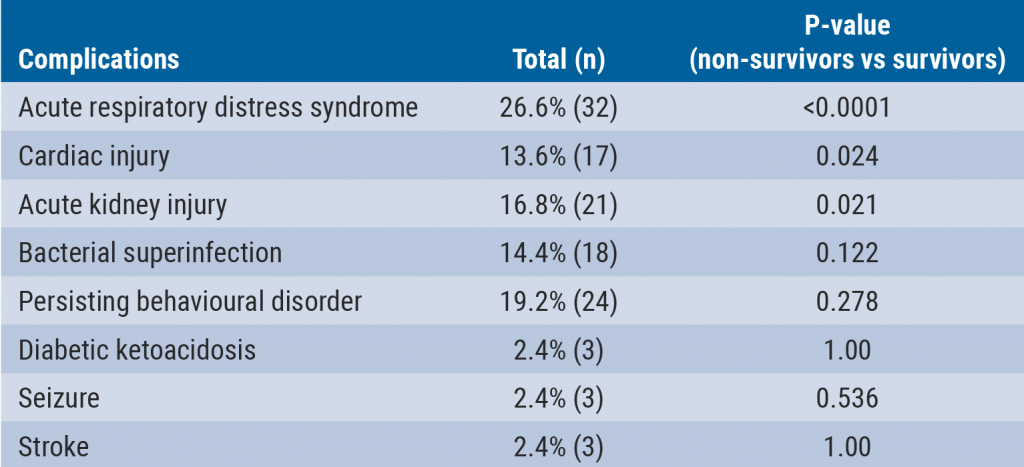Dementia appears independently associated with higher mortality in COVID-19 patients. However, large cohort studies of patients with dementia have been lacking so far. Dr Agathe Vrillon (Hôpital Lariboisière Fernand-Widal, France) reported on the outcomes of 125 patients with dementia hospitalised for confirmed COVID-19 [1]. Median age was 86 years; 67.2% had ≥2 comorbidities. Male sex (41.6%) was associated with mortality (P=0.029).
The most common symptoms at COVID-19 onset were confusion and delirium (82.4%) and asthenia (76.8%). Signs of infection were frequent: fever (72.8%), cough (49.6%), and expectorations (21.6%). Falling was an initial symptom in 35.2% of patients. Dyspnoea (P<0.001) and desaturation (P=0.002) were associated with mortality. Complications significantly associated with death were acute respiratory distress syndrome, cardiac injury, and acute kidney injury (see Table). The most frequently applied treatment was antibiotics (61.6%). Oxygen support was given in 60% of cases, more often in non-survivors (P<0.0001). Steroids were prescribed in only 8%.
Table: Complications of COVID-19 and their relation to survival [1]

The fatality rate at 21 days was 22.4% (n=28). “This is a significant rate, but lower than was reported in similar studies,” according to Dr Vrillon. Median delay between admission and death was 8.5 days. Median length of hospital stay for survivors was 16 days; 40.2% were discharged before end of follow-up. There were 2 independent risk factors of death: chronic renal disease (ExpB=4.631) and CRP at admission (ExpB=1.013).
- Vrillon A, et al. COVID-19 in patients with dementia: clinical features and predictive factors of mortality in a cohort of 125 patients. OPR-144, EAN 2021 Virtual Congress, 19–22 June.
Copyright ©2021 Medicom Medical Publishers
Posted on
Previous Article
« First evidence of brainstem involvement in COVID-19 Next Article
Good long-term safety and efficacy of inebilizumab in NMOSD »
« First evidence of brainstem involvement in COVID-19 Next Article
Good long-term safety and efficacy of inebilizumab in NMOSD »
Table of Contents: EAN 2021
Featured articles
Letter from the Editor
COVID-19
First evidence of brainstem involvement in COVID-19
Cognitive/behavioural alterations persistent after COVID-19
Neural base of persistent hyposmia after COVID-19
Neurological symptoms and complications of COVID-19 affect outcomes
Cerebrovascular Disease
Intracerebral haemorrhage only slightly increases mortality in COVID-19 patients
Stroke with covert brain infarction indicates high vascular risk
Expanding precision medicine to stroke care
Dexamethasone not indicated for chronic subdural haematoma
Cognitive Impairment and Dementia
Severe outcomes of COVID-19 in patients with dementia
Promising diagnostic accuracy of plasma GFAP
Sex modulates effect of cognitive reserve on subjective cognitive decline
Hypersensitivity to uncertainty in subjective cognitive decline
Epilepsy
Minimally invasive device to detect focal seizure activity
‘Mozart effect’ in epilepsy: why Mozart tops Haydn
Migraine and Headache
Factors associated with decreased migraine attack risk
Pregnant migraine patients at higher risk of complications
Occipital nerve stimulation in drug-resistant cluster headache
Rhythmicity in primary headache disorders
Multiple Sclerosis and NMOSD
Typing behaviour to remotely monitor clinical MS status
Alemtuzumab in treatment-naïve patients with aggressive MS
No higher early MS relapse frequency after stopping ponesimod
Good long-term safety and efficacy of inebilizumab in NMOSD
Neuromuscular Disorders
Inability to recognise disgust as first cognitive symptom of ALS
Pathogenic T-cell signature identified in myasthenia gravis
Parkinson’s Disease
Levodopa-carbidopa intestinal gel in patients with advanced PD
New Frontier – Navigated Transcranial Ultrasound
Exploring the possibilities
Related Articles
August 18, 2021
Stroke with covert brain infarction indicates high vascular risk
August 18, 2021
Pathogenic T-cell signature identified in myasthenia gravis
© 2024 Medicom Medical Publishers. All rights reserved. Terms and Conditions | Privacy Policy
HEAD OFFICE
Laarderhoogtweg 25
1101 EB Amsterdam
The Netherlands
T: +31 85 4012 560
E: publishers@medicom-publishers.com

